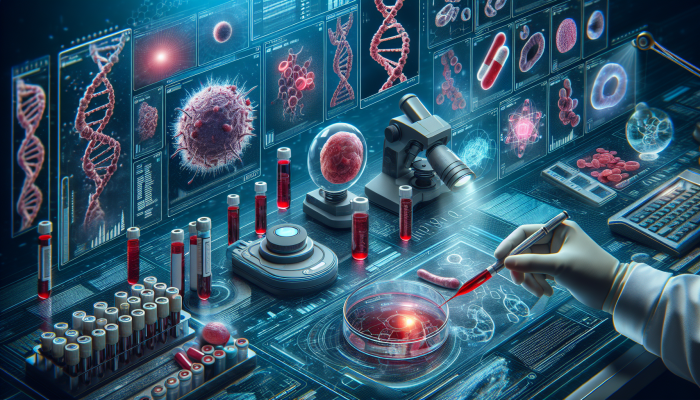Transforming Cancer Detection: Harnessing the Power of Advanced Blood Tests and Cutting-Edge Technologies
The domain of cancer detection is experiencing a profound revolution, significantly driven by the advancements in blood tests for assessing cancer risk. These pioneering tests represent a major breakthrough in identifying potential cancer markers within the human body, facilitating earlier interventions that can substantially improve patient outcomes. To effectively navigate the complex and often intimidating landscape of cancer diagnostics, it is paramount to develop a comprehensive understanding of the core principles that support these tests, along with the latest pioneering innovations emerging in this vital sector of healthcare.
Diving Deep into the Science of Blood Tests for Cancer Risk: A Comprehensive Examination

At the core of blood tests for cancer risk lies the essential identification of specific biological indicators known as biomarkers. These biomarkers serve as critical signals that can indicate the presence of potential cancer or a heightened risk of developing it in the future. They encompass a wide array of substances, including proteins, genes, and various other materials produced either by cancerous cells or by the body's immune responses to the presence of cancer. The scientific underpinnings of these advanced tests rely on sophisticated methodologies that effectively detect these markers, employing a diverse range of cutting-edge technologies.
One of the foremost methodologies utilized in these assessments is the liquid biopsy. This innovative technique involves the evaluation of a blood sample to identify components such as circulating tumor DNA (ctDNA) and circulating tumor cells (CTCs). The non-invasive nature of this approach allows for a thorough assessment of a patient’s cancer risk without the need for more invasive methods like traditional biopsies. Moreover, technological advancements, especially in next-generation sequencing (NGS), have significantly enhanced the sensitivity and specificity of these tests, enabling them to detect even the most minute traces of ctDNA.
The accuracy of blood tests for cancer risk is closely connected to our understanding of cancer biology. Different types of cancer release unique biomarkers into the bloodstream, driving ongoing research aimed at discovering new markers that could function as early warning signals. For example, the levels of prostate-specific antigen (PSA) are routinely monitored to assess prostate cancer risk, while the CA-125 marker is commonly associated with the detection of ovarian cancer.
Furthermore, the integration of artificial intelligence (AI) into the interpretation of test results is profoundly impacting this field. AI algorithms possess the capability to analyze vast datasets, revealing patterns that may remain undetected through human analysis, thus significantly enhancing the predictive capabilities of these tests.
Unveiling the Latest Breakthroughs in Blood Tests for Cancer Risk: Significant Innovations
The field of blood tests for cancer risk is currently witnessing extraordinary innovations that have the potential to transform cancer screening and prevention methodologies. A particularly groundbreaking advancement is the emergence of multi-cancer early detection (MCED) tests. These revolutionary tests are designed to detect multiple types of cancer from a single blood sample, significantly minimizing the need for invasive procedures and improving overall patient comfort and experience.
Recent studies have demonstrated that MCED tests can effectively identify cancers at their earliest stages, often before clinical symptoms manifest. This early detection is critical, as it correlates directly with improved treatment outcomes and higher survival rates. For instance, a study published in a leading oncology journal highlighted the remarkable capability of an MCED test to identify malignancies that are generally difficult to diagnose in their early stages, such as pancreatic cancer and ovarian cancer.
Another significant advancement in this area involves the exploration of methylation patterns found in circulating DNA as a diagnostic tool. Changes in methylation are often indicative of cancerous processes, prompting researchers to investigate how these patterns may be utilized for more precise cancer risk assessment. This cutting-edge method could provide a highly sensitive means of detecting malignancies for which effective screening protocols are currently unavailable, thereby enhancing patient care.
Moreover, partnerships between technology firms and healthcare providers are driving the development of innovative diagnostic tools. These collaborations aim to leverage big data and machine learning to improve blood sample analysis, resulting in more accurate risk assessments and personalized management strategies for patients.
Understanding the Transformative Power of Liquid Biopsies in Cancer Detection and Treatment Approaches
Liquid biopsies represent a revolutionary advancement in the realm of blood tests for cancer risk. Unlike traditional biopsies that require invasive tissue samples, liquid biopsies offer a minimally invasive alternative that can be conducted multiple times, facilitating ongoing monitoring of cancer progression or responses to treatment. This capability is particularly advantageous for patients who may not be suitable candidates for surgical biopsies due to various health factors.
Liquid biopsies function by isolating and analyzing ctDNA or CTCs obtained from a blood sample. The ability to monitor these cellular components provides invaluable insights into tumor dynamics and potential genetic mutations that may arise throughout the course of the disease. For example, identifying specific mutations can aid oncologists in selecting targeted therapies, thereby personalizing treatment plans for greater efficacy and improved success rates.
The incorporation of liquid biopsies into clinical practice is already yielding encouraging results. Recent clinical trials have indicated that these tests can identify recurrences in patients who have previously undergone cancer treatments, often several months ahead of traditional imaging techniques. This prompt detection can enable timely interventions, ultimately enhancing survival outcomes and overall patient health.
Additionally, liquid biopsies allow for real-time monitoring of treatment responses. By tracking ctDNA levels during therapy, healthcare professionals can assess the effectiveness of the treatment plan and make necessary adjustments to optimize patient care. This proactive approach to monitoring signifies a substantial shift towards a more dynamic management of cancer care, ensuring that patients receive tailored treatment that meets their individual needs.
In summary, blood tests for cancer risk, particularly through the application of liquid biopsies, are revolutionizing the field of oncology. Their potential for early detection, continuous disease monitoring, and personalized treatment strategies positions them as invaluable tools in the ongoing fight against cancer. As research and technological advancements continue to progress, the potential for these tests to improve patient outcomes and redefine cancer care remains exceptionally promising and optimistic.
Join Our Facebook Community for the Latest Insights and Updates!

Originally Published On https://bloodtest.co.uk
The Article: Blood Tests for Cancer Risk: Pioneering Early Detection Methods first appeared on: https://ezbloodtest.com
The Article Cancer Risk Blood Tests: Innovative Methods for Early Detection Was Found On https://limitsofstrategy.com

